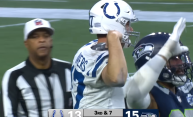Major League Baseball owners will be briefed by a committee that has been working on recommendations for the possible expansion of instant replays at the quarterly MLB owner's meetings Thursday.
The committee, consisting of Braves president John Schuerholz and former MLB managers Joe Torre and Tony LaRussa presented their ideas to MLB commissioner Bud Selig and the MLB's executive council on Wednesday. Selig wouldn't elaborate on what the committee's ideas for future instant replays consisted of, but said that they revealed "a very thoughtful and well-done presentation," according to MLB.com.
MLB.com reports that it's not clear whether or not a vote will be taken Thursday, but some of the subjects expected to be open to possible instant replays include trap plays and fair-foul plays, which the MLB and the Players Association have already agreed upon in the Basic Agreement. The fair-foul plays and trap plays would be added to the replay rules regarding homeruns that already exists.
The MLB reports that Torre was disgusted after seeing a missed tag call during last year's postseason, and is open to reviewing everything besides balls and strikes and even possibly adding more cameras to the ballparks. If more replays are eventually used, it could lead to NFL-style challenges or the possibility of all replays being reviewed in a central location, much like how the National Hockey League has all their reviewed plays looked at in Toronto.
If the owners do vote Thursday and approve of expanded replays, MLB will still have to finish negotiations with the Players Association and Umpires Association before the new system is put in place.
Joe Torre said last May at the Owners Meetings that it's not an easy task to get everyone's approval.
"There are a lot of hurdles," Torre said according to MLB.com. "We're just trying to do what makes sense for the game. You could start replaying stuff from the first inning on and time the game by your calendar. That could be crazy. We have a rhythm in this game that we don't want to disrupt. One of the decisions we want to make is how much of this do we want to do without really disrupting and putting people to sleep."
© Copyright 2025 Sports World News, All rights reserved. Do not reproduce without permission.










